BOOKS
Millennium Development Goals: Ideas, Interests and Influence, London: Routledge, 2017
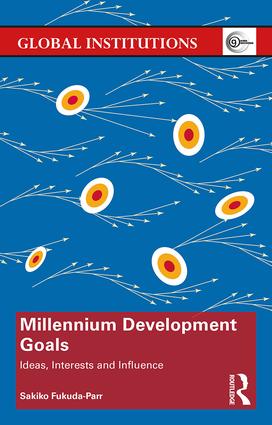 Heralded as a success that mobilized support for development, the Millennium Development Goals (MDGs) ushered in an era of setting development agendas by setting global goals. This book critically evaluates the MDG experience from the capabilities and human rights perspectives, and questions the use of quantitative targets as an instrument of global governance. It provides an account of their origins, trajectory and influence in shaping the policy agenda, and ideas about international development during the first 15 years of the 21st century.
Heralded as a success that mobilized support for development, the Millennium Development Goals (MDGs) ushered in an era of setting development agendas by setting global goals. This book critically evaluates the MDG experience from the capabilities and human rights perspectives, and questions the use of quantitative targets as an instrument of global governance. It provides an account of their origins, trajectory and influence in shaping the policy agenda, and ideas about international development during the first 15 years of the 21st century.
The MDGs, Capabilities and Human Rights. The power of numbers to shape agendas. (coedited with Alicia Ely Yamin) London: Routledge, 2015
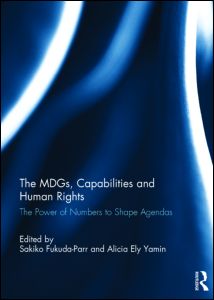 Heralded as opening a new chapter in international development, the Millennium Development Goals (MDGs) have led to the use of global goals and quantitative targets as a central instrument for defining global priorities. This book explores the implications of this new approach. How does target setting influence policy priorities of national governments, bilateral donors, multilateral agencies, NGOs, and other stakeholders? What are the intended and unintended consequences? Why is the use of numeric indicators effective? How does quantification reshape meanings of challenges such as women’s empowerment? This book was originally published as a special issue of the Journal of Human Development and Capabilities.
Heralded as opening a new chapter in international development, the Millennium Development Goals (MDGs) have led to the use of global goals and quantitative targets as a central instrument for defining global priorities. This book explores the implications of this new approach. How does target setting influence policy priorities of national governments, bilateral donors, multilateral agencies, NGOs, and other stakeholders? What are the intended and unintended consequences? Why is the use of numeric indicators effective? How does quantification reshape meanings of challenges such as women’s empowerment? This book was originally published as a special issue of the Journal of Human Development and Capabilities.
Critical and Feminist Perspectives on Financial and Economic Crises (coedited with James Heintz and Stephanie Seguino). London: Routledge, 2015
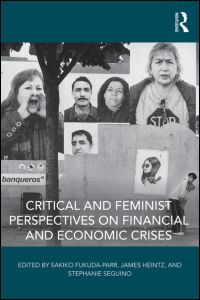 Economic and financial crises have become perennial features of today’s global economy. Macroeconomic theories of crisis, including the global crisis that unfolded in 2008, emphasize the role of financial deregulation; capital flow imbalances; and growing debt, fueled by income and wealth inequality. These approaches tend to be divorced from feminist thinking which analyzes broader distributional dynamics transmitted through structural channels and government policy responses, with an emphasis on gender, race, class and ethnicity. This volume brings together innovative thinking from heterodox macroeconomists and feminist economists to explore the causes, consequences, and ramifications of economic crises. By doing so, it highlights aspects of the economy that are frequently overlooked or ignored, such as the impact of crises on the vast amount of unpaid work which women perform relative to men.
Economic and financial crises have become perennial features of today’s global economy. Macroeconomic theories of crisis, including the global crisis that unfolded in 2008, emphasize the role of financial deregulation; capital flow imbalances; and growing debt, fueled by income and wealth inequality. These approaches tend to be divorced from feminist thinking which analyzes broader distributional dynamics transmitted through structural channels and government policy responses, with an emphasis on gender, race, class and ethnicity. This volume brings together innovative thinking from heterodox macroeconomists and feminist economists to explore the causes, consequences, and ramifications of economic crises. By doing so, it highlights aspects of the economy that are frequently overlooked or ignored, such as the impact of crises on the vast amount of unpaid work which women perform relative to men.
Food Security in South Africa: Human Rights and Entitlement Perspectives ( co-edited with Viviene Taylor). University of Cape Town Press, 2015
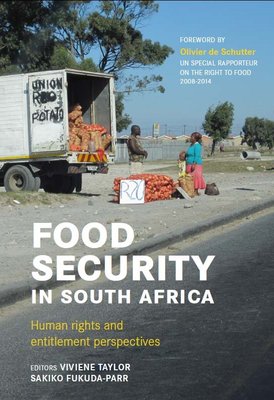 The right to food is guaranteed in South Africa’s Constitution as it is in international law. Yet food insecurity remains widespread and persistent, at levels much higher than in countries with similar levels of per capita GDP and development, such as Brazil. In this book, leading local and international researchers on food security and related policy work have come together to create the first systematic and trans-disciplinary analysis of food security and its multiple dimensions in South Africa and the southern African region.
The right to food is guaranteed in South Africa’s Constitution as it is in international law. Yet food insecurity remains widespread and persistent, at levels much higher than in countries with similar levels of per capita GDP and development, such as Brazil. In this book, leading local and international researchers on food security and related policy work have come together to create the first systematic and trans-disciplinary analysis of food security and its multiple dimensions in South Africa and the southern African region.
Fulfilling Social and Economic Rights (with T. Lawson-Remer and S. Randolph). New York: Oxford University Press, 2015
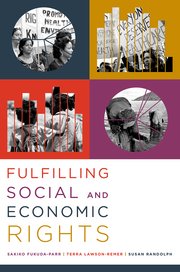 One of the most ambitious legacies of the 20th century was the universal commitment to ensure freedom from want as a human right. But to what extent are countries across the world living up to this commitment? This path breaking book develops an innovative, evidence-based index for comparing performance on education, food, health, work and housing across very differently situated countries and over time. It explores the factors influencing performance and provides empirical evidence to resolve some long standing controversies over the principle of “progressive realization”. By defying the boundaries of traditional research disciplines, this work fundamentally advances our knowledge about the status of and factors promoting social and economic rights fulfillment at the dawn of the 21st century.
One of the most ambitious legacies of the 20th century was the universal commitment to ensure freedom from want as a human right. But to what extent are countries across the world living up to this commitment? This path breaking book develops an innovative, evidence-based index for comparing performance on education, food, health, work and housing across very differently situated countries and over time. It explores the factors influencing performance and provides empirical evidence to resolve some long standing controversies over the principle of “progressive realization”. By defying the boundaries of traditional research disciplines, this work fundamentally advances our knowledge about the status of and factors promoting social and economic rights fulfillment at the dawn of the 21st century.
American Political Science Association 2016 Best Book in Human Rights Scholarship Award; Grawemeyer 2019 Award for Ideas Improving World Order
Preventing Violent Conflict in Africa: Inequalities, Perceptions and Institutions (coeditor with Yoichi Mine, Frances Stewart, Thandike Mkandawire), London: Palgrave McMillan, 2013
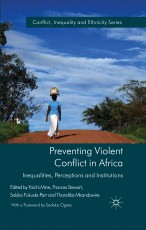 Horizontal inequalities are root causes of violent conflict in Africa. Yet, people take actions not because of statistical data on inequalities, of which they might not be aware, but because of injustices they perceive. This volume analyses the results of original surveys with over 3,000 respondents in African cities and towns, exposing clear discrepancies between objective inequalities and people’s subjective perceptions. The contributors examine experiences in country pairs and probe into the reasons why neighbouring countries, sharing common historical traits, sometimes took contrasting pathways of peace and violent conflict. Combining quantitative analysis and qualitative anatomy of historical experiences of conflict and reconciliation in Rwanda, Burundi, Ghana, Côte d’Ivoire, South Africa, Zimbabwe, Uganda, Tanzania, Kenya and Nigeria, the study brings forward a set of policy recommendations for development practitioners. This work further addresses the issue of institutional choice and reveals how sustainable power-sharing and decentralisation contribute to political stability in Africa.
Horizontal inequalities are root causes of violent conflict in Africa. Yet, people take actions not because of statistical data on inequalities, of which they might not be aware, but because of injustices they perceive. This volume analyses the results of original surveys with over 3,000 respondents in African cities and towns, exposing clear discrepancies between objective inequalities and people’s subjective perceptions. The contributors examine experiences in country pairs and probe into the reasons why neighbouring countries, sharing common historical traits, sometimes took contrasting pathways of peace and violent conflict. Combining quantitative analysis and qualitative anatomy of historical experiences of conflict and reconciliation in Rwanda, Burundi, Ghana, Côte d’Ivoire, South Africa, Zimbabwe, Uganda, Tanzania, Kenya and Nigeria, the study brings forward a set of policy recommendations for development practitioners. This work further addresses the issue of institutional choice and reveals how sustainable power-sharing and decentralisation contribute to political stability in Africa.
Human Rights and the Capabilities Approach: An interdisciplinary dialogue (editor with Diane Elson and Polly Vizard) London: Routledge, 2011
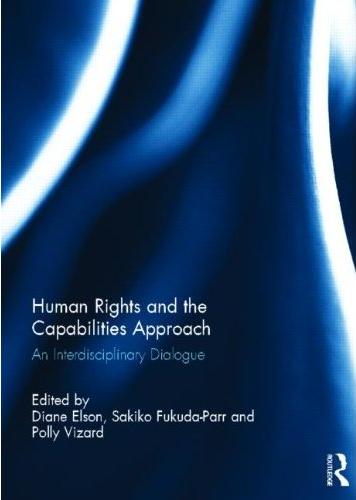 The book includes contributions from some of the leading scholars in the two fields of capabilities approach and human rights. It covers the essential aspects of this relationship: addressing the complementarities between human rights and capabilities as theoretical concepts; how the concept of capabilities can contribute to resolving some key theoretical issues in human rights; how the social science analysis and methods of the capabilities approach can clarify human rights concepts and strengthen human rights advocacy; and how human rights norms can strengthen public policy and mobilize collective action to demand greater accountability in placing human priorities first in public policy. Human Rights and the Capabilities Approach raises many questions for further inter-disciplinary conversation and further research.
The book includes contributions from some of the leading scholars in the two fields of capabilities approach and human rights. It covers the essential aspects of this relationship: addressing the complementarities between human rights and capabilities as theoretical concepts; how the concept of capabilities can contribute to resolving some key theoretical issues in human rights; how the social science analysis and methods of the capabilities approach can clarify human rights concepts and strengthen human rights advocacy; and how human rights norms can strengthen public policy and mobilize collective action to demand greater accountability in placing human priorities first in public policy. Human Rights and the Capabilities Approach raises many questions for further inter-disciplinary conversation and further research.
This book was originally published as a special issue of the Journal of Human Development and Capabilities, and has been expanded with two additional articles from this journal and a new foreword by Professor Amartya Sen.
The Handbook on Human Development (edited with Shiva Kumar) New Delhi: Oxford University Press (third edition, earlier editions titled Readings in Human Development), 2008
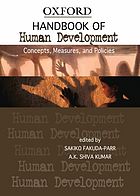 Among the most influential ideas that have shaped development thinking in recent years is the concept of human development. The perspective is particularly critical in today’s world as we collectively think of solutions to end global poverty, promote human security and establish a just and peaceful society for all.
Among the most influential ideas that have shaped development thinking in recent years is the concept of human development. The perspective is particularly critical in today’s world as we collectively think of solutions to end global poverty, promote human security and establish a just and peaceful society for all.
This volume brings together the collection of papers that have shaped the human development approach with its set of concepts, measurement tools, and policy perspectives. The volume is divided into four sections: conceptual foundations, measurement, policy explorations, and new frontiers addressing the political dimensions of human development. The original contributions, so ably put together by the contributors, will stimulate thinking and action.
The Gene Revolution: GM Crops and Unequal Development. London: Earthscan, Editor and main contributor, 2007
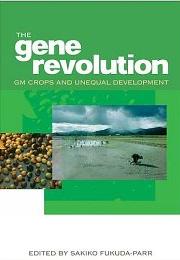 Whether or not to embrace GM technologies is a fundamental and politically charged question facing humanity in the 21st century, particularly in light of rapidly growing populations and the unknown future impacts of climate change.
Whether or not to embrace GM technologies is a fundamental and politically charged question facing humanity in the 21st century, particularly in light of rapidly growing populations and the unknown future impacts of climate change.
The Gene Revolution is the first book to bridge the gap between the naysayers and cheerleaders and look at the issues and complexities facing developing and transitional countries over decisions about GM in light of the reality of what is happening on the ground. The first part of the volume looks at the rise of GM crops, commercialization and spread of the technology and the different positions of the USA and the European Union on the GM question and the effect of global markets. The second part consists of perspectives from Argentina, Brazil, China, India and South Africa, which provide insight into the profound challenges these countries face and the hard choices that have to be made. The final part takes the analysis a step further by comparing developing and transitional country experiences, and charts a future course for government policy on GM that supports growth, sustainability and
equity for the many billions of people affected worldwide.
Human Insecurity in a Global World. (edited with L. Chen and E. Seidensticker) Global Equity Initiative, Harvard University. Cambridge: Harvard University Press, 2003
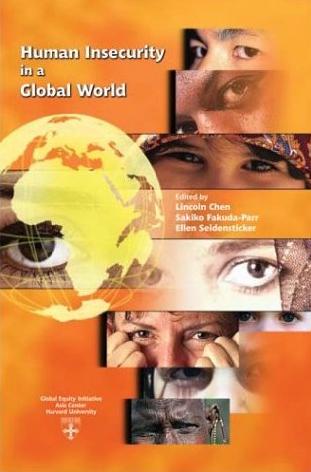 The decade of the 1990s witnessed enormous changes in the international environment. The Cold War conclusively ended. Biotechnology and communications technology made rapid advances. Barriers to international trade and investment declined. Taken together, these developments created many opportunities for peace and prosperity.
The decade of the 1990s witnessed enormous changes in the international environment. The Cold War conclusively ended. Biotechnology and communications technology made rapid advances. Barriers to international trade and investment declined. Taken together, these developments created many opportunities for peace and prosperity.
At the same time, with the end of superpower domination, ethnically based intranational conflicts brought on widespread suffering. And while globalization expanded opportunity, growth, and incomes, it increased inequality of incomes and decreased human security. Moreover, as countries have become more closely linked, insecurity in one country has affected security in other countries.
Capacity for Development: Old Problems, New Solutions. (.pdf) (edited with K. Malik and C. Lopes) London. Earthscan, 2002
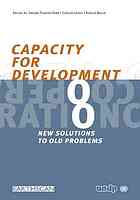 Capacity for Development brings together innovative and well-supported studies of technical cooperation along with its potential to build sustainable capacities in developing countries, by enhancing the knowledge, skills and productive aptitudes of their populations. A team of eminent development professionals and economists examine the achievements of technical cooperation and offer recommendations for reform in the context of globalization, democratization, the information revolution and the growth of capacities in the South. They analyze the issues from three perspectives: ownership, capacity enablers and knowledge. The team show how the complex processes involved can be restructured to produce local involvement and empowerment, set out a normative framework for the input from society, and describe a new paradigm of knowledge for capacity building in the network age. This book will be essential reading for all development professionals and policy-makers, as well as providing an invaluable research and teaching resource.
Capacity for Development brings together innovative and well-supported studies of technical cooperation along with its potential to build sustainable capacities in developing countries, by enhancing the knowledge, skills and productive aptitudes of their populations. A team of eminent development professionals and economists examine the achievements of technical cooperation and offer recommendations for reform in the context of globalization, democratization, the information revolution and the growth of capacities in the South. They analyze the issues from three perspectives: ownership, capacity enablers and knowledge. The team show how the complex processes involved can be restructured to produce local involvement and empowerment, set out a normative framework for the input from society, and describe a new paradigm of knowledge for capacity building in the network age. This book will be essential reading for all development professionals and policy-makers, as well as providing an invaluable research and teaching resource.
SPECIAL ISSUES, JOURNAL ARTICLES & CHAPTERS
2020, “Southern origins of sustainable development goals: Ideas, actors, aspirations” (with Bhumika Muchhala). World Development 126
2019, “Introduction – Data, Knowledge and Politics in Localizing the SDGs” (with Angelina Fisher), Journal of Human Development and Capabilities 20.4 Special Issue
2019, “Capability Approach and Human Development” (with Ismael Cid Martinez), chapter 13, The Palgrave Handbook of Development Economics: Critical Reflections and Emerging Policy Perspectives, ed Machiko Nissanke and Jose Antonio Ocampo, Palgrave Macmillan.
2019, “The Southern origins of sustainable development goals: Ideas, actors, aspirations” (with Bhumika Muchhala), World Development
2019, “Knowledge and Politics in Setting and Measuring the SDGs – Introduction to Special Issue” (with Desmond McNeill), Global Policy Journal
2019, Keeping Out Extreme Poverty from the SDG Agenda – the Politics of Indicators, Global Policy Journal
2018, “Sustainable Development Goals”, chapter 42 in Thomas G. Weiss and Sam Dawes, The Oxford Handbook on the United Nations, OUP, Oxford and New York
2018, “Developmental States, Neoliberalism and the Right to Food: Brazil and South Africa” chapter 11 in Diane Frey and Gillian McNaughton, eds. Economic and Social Rights in a Neoliberal World, Cambridge University Press, New York and Cambridge
2017, “Political origins of health inequalities: trade and investment agreements” (with Desmond McNeill, Pepita Barlow, Carolyn Deere Birkbeck, Sakiko Fukuda-Parr, Anand Grover, Ted Schrecker, and David Stuckler, as the Independent Panel on Global Governance for Health, University of Oslo). The Lancet; 389: 760-62
2017, “Trade and Investment Agreements: Implications for Health Protection” (with Desmond McNeill, Pepita Barlow, Carolyn Deere Birkbeck, Sakiko Fukuda-Parr, Anand Grover, Ted Schrecker, and David Stuckler, as the Independent Panel on Global Governance for Health, University of Oslo). Journal of World Trade 51, no.1: 159-182
2016, “From the Millennium Development Goals to the Sustainable Development Goals: shifts in concept, purpose, and politics of global goal setting for development”. Gender and Development 24:1
2015, “Human Rights and Politics in Development” chapter 12 in Goodhart, Michael, ed. Human Rights and Politics, Oxford: Oxford University Press (third edition)
2015, “Post 2015: A New Era of Accountability?” (with Desmond McNeill) Journal of Global Ethics, 11:1
2015, “Food Security as if Gender Equality and Sustainability Mattered”. Chapter 4 in Leach, Melissa (ed) Gender Equality and Sustainability. London: Routledge
2014, “The Power of Numbers: A Critical Review of Millennium Development Goal Targets for Human Development and Human Rights” (with Alicia Yamin and Joshua Greenstein) Journal of Human Development and Capabilities. 15:2-3.
2014, “Global Goal Setting as a Tool of Global Governance: Intended and Unintended consequences”, Journal of Human Development and Capabilities. 15:2-3
2014, “The MDG Hunger Target and Competing Frameworks of Food Security” (with Amy Orr) Journal of Human Development and Capabilities. 15:2-3
2014, “Global Governance for Health: Political origins of health inequalities”, The Lancet 383:9917 p 630-667 (with Ole Peter Ottersen et al) Report of the University of Oslo/the Lancet Commission on Global Governance for Health, London
2013, “Delivering the Vision of the Millennium Declaration”. Chapter 13, OECD Development Cooperation Report 2013: Ending Poverty. Paris:OECD. http://www.oecd.org/dac/dcr2013.htm
2013, “Should global goal setting continue, and how, in the post 2015 era?” chapter in Alonso, Jose Antonio, Andrea Cornia and Rob Vos, eds. Alternative Development Strategies in the Post 2015 Era, Bloomsbury Press, London and New York
2013, “Introduction: Disentangling the Linkages between Horizontal Inequalities and Political Institutions” (with Arnim Langer and Yoichi Mine) in Mine, Yoichi, Frances Stewart, Sakiko Fukuda-Parr and Thandike Mkandawire, Preventing Violent Conflict in Africa, London: Palgrave Macmillan
2013, “Monitoring MDGs: Human Rights Critique and Alternative” (with Joshua Greenstein) chapter in M. Langford, A. Sumner, and A. Yamin, (eds.) The Millennium Development Goals and Human Rights. Cambridge: Cambridge University Press.
2013, “How should MDG Implementation be Measured: Faster Progress or Meeting Targets?” World Development 41.1 19-30 (with Joshua Greenstein and David Stewart)
2012, “The Right to Development: a new discourse for the twenty first century” Social Research 79:4
2012, “The Turn to Metrics”, Nordic Journal of Human Rights, 30:3 (with Malcolm Langford)
2012, “Recapturing the Narrative of Development” chapter in David Hulme and Rorden Wilkinson eds. The Millennium Development Goals and Beyond: Global Development After 2015, London: Routledge
2012, “Human Security” in Brown, Graham and Arnim Langer, The Elgar Companion to Civil War and Fragile States, Cheltenham: Edward Elgar Publishing
2011, “Correcting Horizontal Inequality as a Development Priority: Poverty Reduction Strategy Papers (PRSPs) in Haiti, Liberia and Nepal” in Langer, Arnim, Frances Stewart and Rajesh Venugopal eds. Horizontal Inequalities and Post-Conflict Reconstruction: Laying the Foundation for Durable Peace, Basingstoke, UK: Palgrave Macmillan
2011, “The Metrics of Human Rights: Complementarities of the Human Rights and Capabilities Approach“ Journal of Human Development and Capabilities 12:1
2011, “The Capabilities Approach and Human Rights”, (with Polly Vizard and Diane Elson) Journal of Human Development and Capabilities 12:1
2011, “Theory and Policy in International Development: Human Development and Capability Approach and the Millennium Development Goals” International Studies Review 13:1
2011, “International Norm Dynamics and ‘the End of Poverty’: Understanding the Millennium Development Goals” (with David Hulme) Global Governance 17:1
2010, “Economic and Social Rights Fulfillment Index: Country Scores and Rankings” (with Susan Randolph and Terra Lawson-Remer), Journal of Human Rights 9:3
2010, “Global Poverty & Unequal Development: Contemporary trends and issues”, Chapter in Poverty and Morality. Peter Hoffenberg, ed. Ethikon Series in Comparative Ethics, New York, Cambridge University Press
2010, “The Missing MDG: Reducing Inequality”, IDS Bulletin, 41.1 Falmer: Institute of Development Studies, University of Sussex
2009, “Conflict Prevention as an Objective of Development Aid” in George Mavrotas, ed. Foreign Aid for Development, Oxford: Oxford University Press
2009, “Development and security: towards greater coherence in international agendas” in Necla Tschirgi and Francesco Mancini (eds) Critical Connections: Development and Security, Denver: Lyn Rienner Publishers
2009, “Unequal development in the 1990s: gaps in human capabilities” (with David Stewart) in Sudhir Anand, Paul Segal and Joseph E. Stiglitz (eds), Debates in the Measurement of Global Poverty, New York: Oxford University Press
2009, “An Index of Economic and Social Rights Fulfillment: Concept and Methodology” (with Terra Lawson-Remer and Susan Randolph) Journal of Human Rights 8:3
2008, “Human Rights and Development” in Kaushik Basu and Ravi Kanbur (eds) Arguments for a Better World: Essays in Honour of Amartya Sen, Vol II Societies, Institutions and Development. Oxford: Oxford University Press.
2008, “An Integrated Framework for Peacebuilding, Human Rights and Development: Reflections on Liberia’s Poverty Reduction Strategy” (with Erin McCandless) in Kenneth Omeje ed. War to Peace Transition: Conflict, Intervention and Peacebuilding in Liberia, Lanham, Maryland: University Press of America
2008, “Conflict-development Nexus: Survey of Armed Conflicts in sub-Saharan Africa 19980-2006” (with M. Ashwill, C. Messineo, E. Chiappa). Journal of Peacebuilding and Development 4:1
Reprinted chapter in: Mavrotas, George ed. Security and Development, Cheltenham: Edward Elgar Publishing
2008, “The Intellectual Journey Continues: Today’s global agenda and the new frontiers of human development” in Khadija Haq and Richard Ponzio, eds. Pioneering the Human Development Revolution: An Intellectual Biography of Mahbub ul Haq New Delhi: Oxford University Press
2007, Four chapters in Fukuda-Parr, ed. The Gene Revolution: GM crops and unequal development. Earthscan, London.
Chapter 1: Genetically Modified Crops and Development Priorities
Chapter 2: The emergence and spread of GM crops: explaining the role of institutional change
Chapter 11: Institutional Changes in Argentina, Brazil, China, India and South Africa: Comparative Analysis
Chapter 12: The Role of government Policy: for Growth, Sustainability and Equity
2006, “Millennium Development Goal 8 – international human rights obligations?” Human Rights Quarterly. Vol 28 No.4
Reprinted with modification in: 2007 “International Obligations for Economic and Social Rights: The Case of the Millennium Development Goal 8.” in S. Hertel and A. Minkler (eds.), Economic Rights: Conceptual, Measurement, and Policy Issues, New York: Cambridge University Press
2006, “Has the Human Development Approach Influenced Policy? – Review of World Development Reports 1980, 1990, 2000/2001”. Indian Journal of Human Development 1:1
2006, “Mahbub ul Haq” in The Elgar Companion to Development Economics, (with Selim Jahan) ed. David Clark. Cheltenham: Edward Edgar Publishing
2006, “International Cooperation for Human Security: a coherent agenda for development and conflict prevention” Kokuren Kenkyu Journal,
2006, “Global actors, markets and rules driving the diffusion of genetically modified (GM) crops in developing countries”. International Journal of Technology and Globalisation 2:1-2
2005, “Poverty and Inequality – Challenges in the Era of Globalisation” in Sten Ask and Anna Mark Jungkvist, eds. The Adventure of Peace. Dag Hammarskjold and the Future of the UN. Basingstoke: Palgrave Macmillan
2005, “Millennium Development Goals: Why They Matter” Global Governance 10:4
2004, “Cultural Freedom and Human Development Today” Daedalus. Summer 2004.
2004, “Millennium Development Goals: The pledge of world leaders to end poverty will not be met with business as usual” Journal of International Development. 16
2004, “Gender and New Threats to Human Security in the Era of Globalization’. Peace Review 16:1
2003, “The Human Development Paradigm, Operationalizing Sen’s Ideas on Capabilities” in Feminist Economics 9:2-3
2003, “Rescuing the Human Development Concept from the Human Development Index: Reflections on a New Agenda” in Fukuda-Parr and Shivakumar, eds. Readings in Human Development, New Delhi, Oxford University Press.
2003, “Using the HDI for Policy Analysis” (with K. Raworth and A.K. Shivakumar) in Fukuda-Parr and Shivakumar, eds. Readings in Human Development, New Delhi: Oxford University Press
2003, “New Threats to Human Security in the Era of Globalization” Journal of Human Development 4:2
2002 “The Network Age: Creating new models of technical cooperation” in Fukuda-Parr et al, eds. 2002 Capacity for Development: Old Problems, New Solutions. London: Earthscan (with Ruth Hill)
2002, “Institutional Innovations for Capacity Development” Introduction in Fukuda-Parr et al eds, Capacity for Development: Old Problems, New Solutions (with Carlos Lopes and Khalid Malik)
2002, “Measuring the Technology Achievement of Nations and the Capacity to Participate in the Network Age” in The Journal of Human Development. 3:1 (with Meghnad Desai, Claes Johansson and Francisco Sagasti)
2001, “Indicators of Human Rights and Human Development, overlaps and differences….. and what about the Human Development Index”. Statistical Journal of the UN Economic Commission for Europe 18:2-3
2000, “In search of indicators of culture and development: progress and Proposals” in UNESCO World Culture Report 2000
1999, “What does Feminization of Poverty Mean? It isn’t just lack of income”. Feminist Economics, 5:2
1995, “Redefining Technical Cooperation: challenge for the UN or let’s dump the technical cooperation mandate” IDS Bulleltin 5:4, special issue Fifty Years On: The UN and Economic and Social Development, eds. Hans Singer and Richard Jolly
1995, “From Capacity Development to Capacity Utilisation” International Journal of Technical Cooperation 1:2
WORKING PAPERS & REPORTS
2018, “Voluntary National Review Reports – what do they report?” (by UN CDP subgroup on VNRs) UN CDP Background Paper 46 July 2018 https://www.un.org/development/desa/dpad/publication/voluntary-national-review-reports-what-do-they-report/
2018, “Leaving No One Behind as a Site of Contestation and Reinterpretation”, (with Thea Smaavik Hegstad, CDP Background Paper 47. https://www.un.org/development/desa/dpad/publication/leaving-no-one-behind-as-a-site-of-contestation-and-reinterpretation/
2018, “Trade Agreements and Policy Space for Achieivng Universal Health Coverage”, UN CDP Background Paper 38 https://www.un.org/development/desa/dpad/publication/background-paper-38-trade-agreements-and-policy-space-for-achieving-universal-health-coverage/
2016, “Promoting Innovation and Access to Health Technologies”, Report of the UN Secretary General’s High Level Panel on Access to Medicines (member of Panel), UN www.unsgaccessmeds.org
2016, “Normative Framing of Development Cooperation: Japanese Bilateral Aid betwen the DAC and Southern Donors” (with Hiroaki Shiga) Working Paper 130, JICA Research Institute https://jica-ri.jica.go.jp/publication/assets/JICA-RI_WP_No.130.pdf
2011, “Does Budget Transparency Lead to Stronger Human Development Outcomes and Commitments to Economic and Social Rights?” Working Paper 4, International Budget Initiative, (with Terra Lawson Remer and Patrick Guyer) http://internationalbudget.org/wp-content/uploads/IBP-Working-Paper-4-Budget-Transparency-and-Development-Outcomes-and-Rights.pdf
2009, “Empowering People: Human Rights Review of Haiti’s Poverty Reduction and Growth Strategies” Report commissioned by the UN Office of the High Commissioner for Human Rights
2008, “Integrating Conflict Prevention in Development Policy and Aid Agendas: Policy Messages from the Wilton Park Confernce on Conflict Prevetion and Development cooperation in Africa, a policy workshop. November 8-11, 2007. Wilton Park, UK” http://www.jica.go.jp/english/resources/publications/study/topical/prevention/001.pdf
2007, Papers for Wilton Park Policy Workshop on Conflict Prevention and Development Cooperation in Africa: A Policy Workshop http://www.wiltonpark.org.uk/documents/conferences/WP889/participants/participants.aspx :
‘Conflict prevention and development cooperation: Joint project of JICA and UNDP – A concept Paper’ (with Robert Picciotto) Background paper 1
‘Human Rights, State Capacity and Economic Policy’ (with Juan Alberto Fuentes)
2007, “Human rights and national poverty reduction strategies: Conceptual framework for human rights analysis of PRSPs and reviews of Guatemala, Liberia and Nepal” University of Connecticut Human Rights Institute, Economic rights Working Papers 2007 (2). http://ideas.repec.org/s/uct/ecriwp.html
2007, “Integrating Human Rights into National Poverty Reduction Strategies: the challenge of development with equity and the Liberia iPRS” University of Connecticut Human Rights Institute, Economic rights Working Papers 2007 (2). http://ideas.repec.org/s/uct/ecriwp.html
2007, “From Income to a Multidimensional Measure of Poverty: the Case of the Human Poverty Index” Poverty in Focus, International Poverty Centre, UNDP, Brasilia
For complete archives of work, please visit the following online databases:
Research Papers in Economics: Sakiko Fukuda-Parr author page
Social Science Research Net: Sakiko-Fukuda-Parr author page
